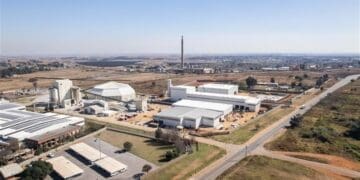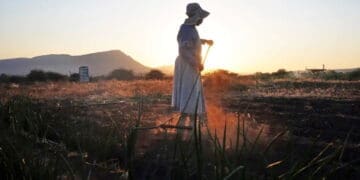Minister of Agriculture John Steenhuisen has raised concern over the rise of poor-quality and adulterated honey in local stores and as a result the department will launch a national operation next month to remove fake products from shelves.
Steenhuisen said this forms part of broader efforts to ensure consumers get the quality they pay for while supporting genuine local producers.
Bees contribute more than R10 billion yearly to South Africa’s agricultural economy through pollination. From macadamia farms in Mpumalanga to citrus orchards in Limpopo and almond plantations in the Western Cape, bees ensure that crops bear fruit and communities thrive.
“Bees are the farmers of the sky,” Steenhuisen remarked at the recent Beekeeping Awareness Field Day at Oude Raapkraal, Westlake in Cape Town.
Hosted with the South African Bee Industry Organisation, the event brought together beekeepers, farmers, and environmental stewards to discuss bees’ role in agriculture and explore small business opportunities in the beekeeping sector.
Steenhuisen’s message was clear, “bees are not just pollinators but economic partners” whose survival directly affects food production, job creation and rural development.
Steenhuisen said without bees, supermarket shelves would be emptier, food prices would rise and farmers would face deeper poverty. For smallholder farmers in particular, having no pollinators results in lower yields, reduced income and greater vulnerability.
While the government’s acknowledgment of the sector brought some optimism, farmers believe the challenges they face daily remain overlooked.
Shah Heeda, an emerging beekeeper from Cape Town, highlighted a common challenge.
“As a brown beekeeper, my wish is access to land to put my hives on,” he said.
His words reveal a deeper challenge for all farmers. Access to land and proper infrastructure is still out of reach.
Others took to social media to respond to Steenhuisen’s speech.
Siyabonga Mnguni applauded the government’s efforts but called for immediate regulation.
“Well done minister,” he wrote. “Now we need to regulate all these fake honey that we get from our grocery stores and provide assistance to small rural beekeeping farmers.”
His comment captures frustration about fake and diluted honey products flooding the shelves.
The Bee Free African Honey Bees organisation, which studies and relocates bees across the country, had an urgent voice.
“Do something about the loads of non-registered people selling our honey and adding syrup,” they commented.
“No sympathy for all the sugar diabetes people buying and using honey that can’t be traced back to the source, there’s too many resellers in South Africa that aren’t even beekeepers.”
Their statement calls for stricter regulation and proper traceability.
Liesl Catherine Lang from Mpumalanga shared a more reflective view.
“I love this,” she wrote. “More people should be made aware of how important bees are to our planet. I wish I could keep a couple of hives myself.”
Her sentiment shows that public awareness and education still play a vital role in sustaining the industry.
The department is developing a National Beekeeping Strategy to guide sustainable production and support emerging entrepreneurs. A Residue Monitoring Plan, which will enable South Africa to export honey to the European Union, is being finalised, opening a lucrative international market.
A Honey Value Chain Round Table Forum is also being established to improve coordination between producers, cooperatives, and policymakers. Additionally, the Agricultural Research Council is researching bee health and diseases, including managing American Foulbrood, a serious threat to honeybee populations.
Earlier this year, South Africa joined the 49th Apimondia International Congress to boost cooperation with the European Union and expand its role in the global honey trade. Steenhuisen noted that Tanzania, Ethiopia, and Zambia already export to the EU. South Africa aims to follow soon.
KwaZulu-Natal hunter Jaco Prinsloo raised another critical issue about the rising theft and vandalism of beehives.
“John Steenhuisen please help us with legislation on the theft and vandalising of our beehives,” he pleaded.
“We lose millions each year with the theft of our beehives and honey.”
The message from farmers is clear. They want practical interventions, land access, fair regulation, protection from theft, and real recognition of their contribution to food systems.
Azwi@vutivibusiness.co.za































































